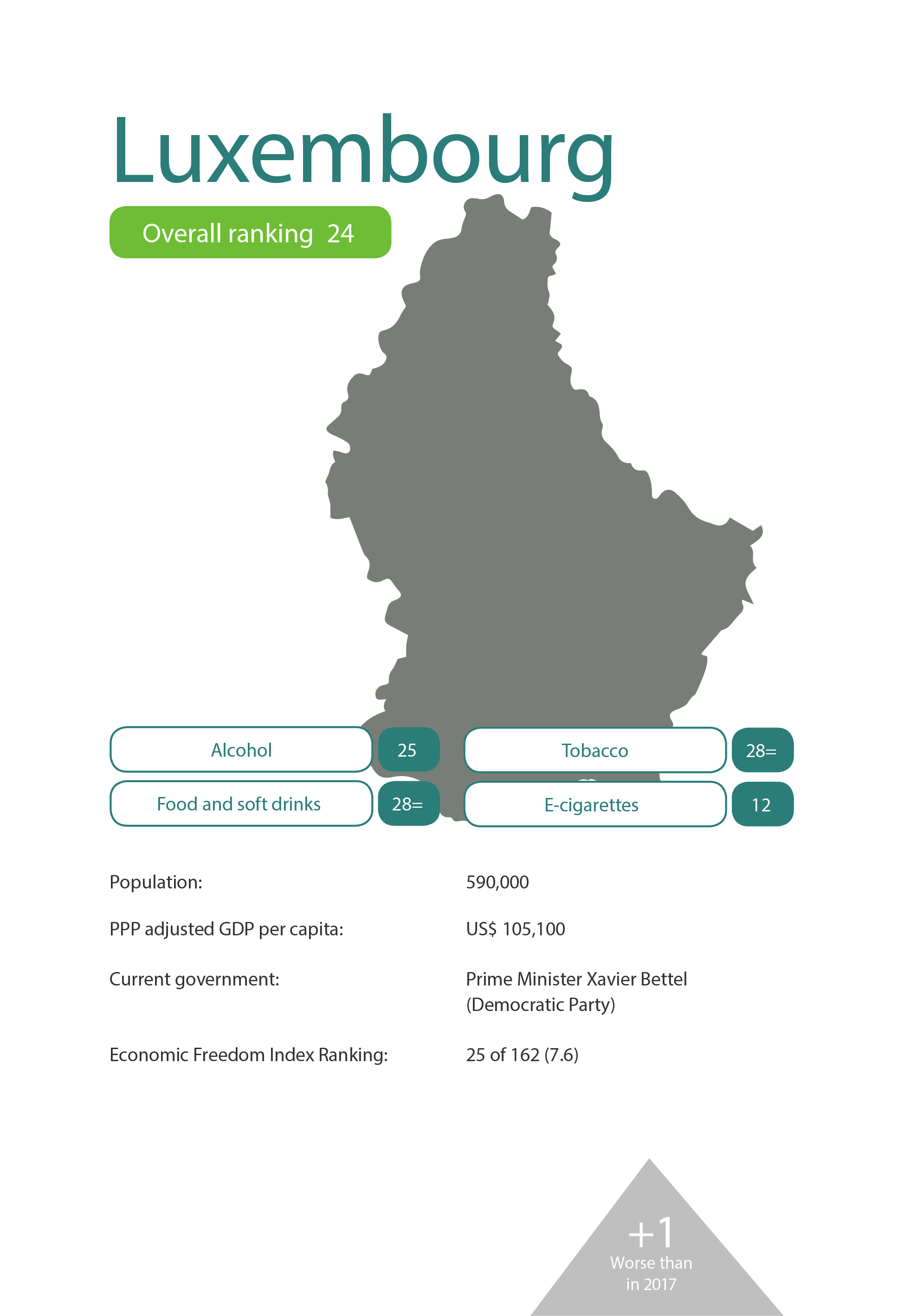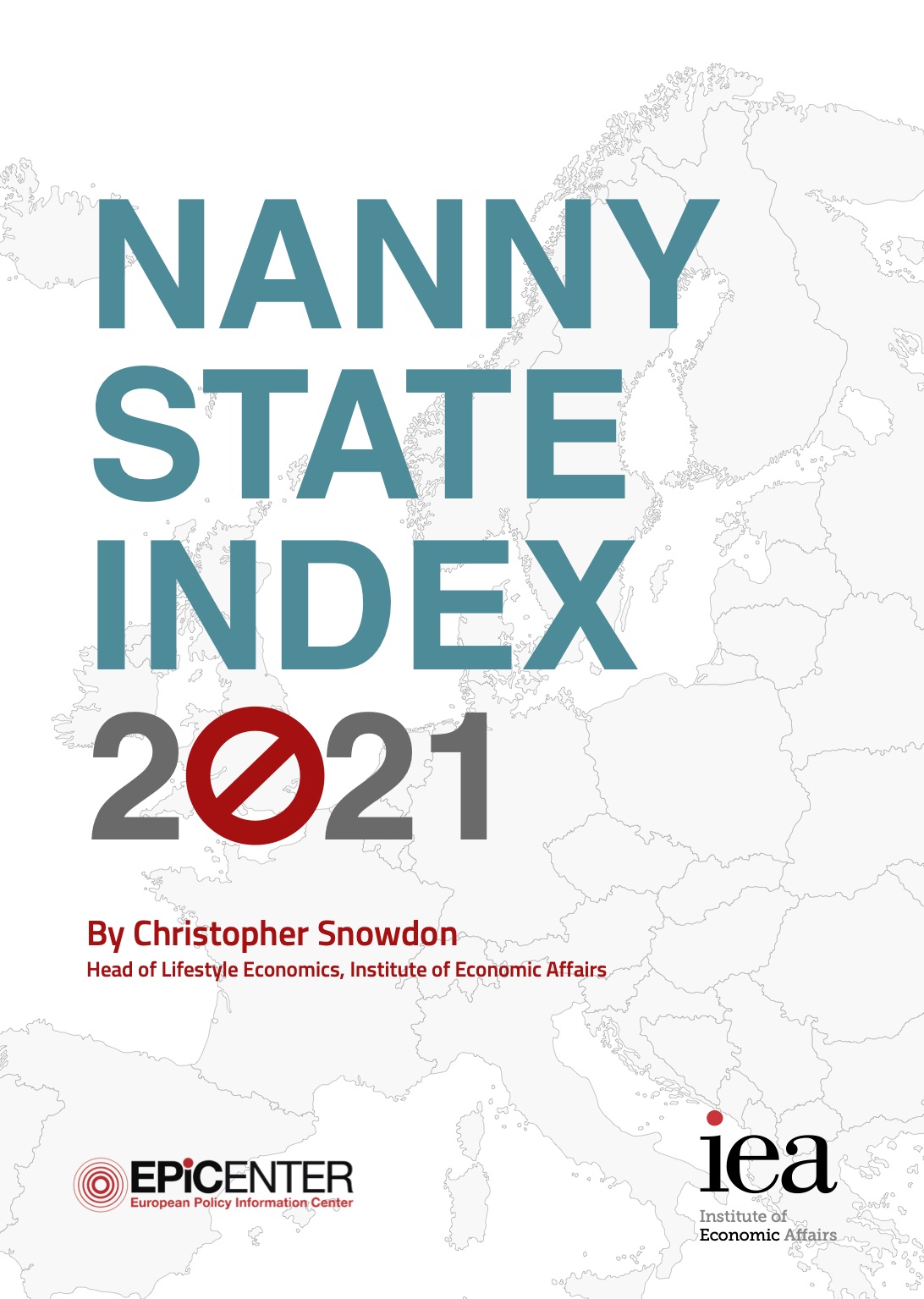
In most respects, Luxembourg performs well in the Nanny State Index, partly because its high level of wealth makes its sin taxes relatively affordable. Even without adjusting for income, taxes on beer and spirits are the third lowest and seventh lowest in the EU respectively, and there is no wine duty. Tobacco taxes are average in cash terms and low relative to average incomes. The government even intends to legalise cannabis in the next few years.
There is no retail display ban for tobacco, nor is there a vending machine ban. Restrictions on alcohol advertising are relatively trivial. There are no nanny state policies for food and soft drinks.
Luxembourg’s partial smoking ban means that smoking is permitted in designated rooms and in licensed cigar bars. In August 2017, a ban was introduced on smoking in vehicles in which a child under 12 years is travelling, and smoking was banned in and around children’s playgrounds.
Although there is no tax on vape juice, Luxembourg’s regulation of e-cigarettes leaves much to be desired. Luxembourg’s former health minister, Lydia Mutsch, took a dim view of vaping, believing it to be a gateway to smoking.[1] E-cigarette advertising is banned everywhere except at point of sale and cross-border sales are illegal. As part of the process of implementing the EU’s Tobacco Products Directive, the Luxembourg government decided to apply the same rules to vaping indoors and e-cigarette advertising as it applies to tobacco (ie. a partial ban and a near-total ban, respectively). E-cigarette companies must pay a fee of €5,000 to put a new product on the market. Cross-border e-cigarette sales are also illegal.
With thanks to Bill Wirtz, Consumer Choice Center
[1] https://blog-vape.com/en/2017/07/11/new-taxes-on-vaping-products-in-luxembourg/
About
The Nanny State Index (NSI) is a league table of the worst places in Europe to eat, drink, smoke and vape. The initiative was launched in March 2016 and was a media hit right across Europe. It is masterminded and led by IEA’s Christopher Snowdon with partners from all over Europe.
Enquiries: info@epicenternetwork.eu
Download Publication

Previous version: 2019
Categories
About the Editor
Christopher Snowdon is the head of Lifestyle Economics at the Institute of Economic Affairs. His research focuses on lifestyle freedoms, prohibition and policy-based evidence. He is a regular contributor to the Spectator, Telegraph and Spiked and often appears on TV and radio discussing social and economic issues.
Snowdon’s work encompasses a diverse range of topics including ‘sin taxes’, state funding of charities, happiness economics, ‘public health’ regulation, gambling and the black market. Recent publications include ‘Drinking, Fast and Slow’, ‘The Proof of the Pudding: Denmark’s Fat Tax Fiasco’, ‘A Safer Bet’, and ‘You Had One Job’. He is also the author of ‘Killjoys’ (2017), ‘Selfishness, Greed and Capitalism’ (2015), ‘The Art of Suppression’ (2011), ‘The Spirit Level Delusion’ (2010), ‘Velvet Glove, Iron Fist’ (2009).
Luxembourg 2019

In most respects, Luxembourg performs well in the Nanny State Index, partly because its high level of wealth makes its sin taxes relatively affordable. Even without adjusting for income, taxes on beer and spirits are the third lowest and seventh lowest in the EU respectively, and there is no wine duty. Tobacco taxes are average in cash terms and low relative to average incomes. The government even intends to legalise cannabis in the next few years.
There is no retail display ban for tobacco, nor is there a vending machine ban. Restrictions on alcohol advertising are relatively trivial. There are no nanny state policies for food and soft drinks.
Luxembourg’s partial smoking ban means that smoking is permitted in designated rooms and in licensed cigar bars. In August 2017, a ban was introduced on smoking in vehicles in which a child under 12 years is travelling, and smoking was banned in and around children’s playgrounds.
Although there is no tax on vape juice, Luxembourg’s regulation of e-cigarettes leaves much to be desired. Luxembourg’s former health minister, Lydia Mutsch, took a dim view of vaping, believing it to be a gateway to smoking.[1] E-cigarette advertising is banned everywhere except at point of sale and cross-border sales are illegal. As part of the process of implementing the EU’s Tobacco Products Directive, the Luxembourg government decided to apply the same rules to vaping indoors and e-cigarette advertising as it applies to tobacco (ie. a partial ban and a near-total ban, respectively). E-cigarette companies must pay a fee of €5,000 to put a new product on the market. Cross-border e-cigarette sales are also illegal.
With thanks to Bill Wirtz, Consumer Choice Center
[1] https://blog-vape.com/en/2017/07/11/new-taxes-on-vaping-products-in-luxembourg/

 Austria
Austria Belgium
Belgium Bulgaria
Bulgaria Croatia
Croatia Cyprus
Cyprus Czech Republic
Czech Republic Denmark
Denmark Estonia
Estonia Finland
Finland France
France Germany
Germany Greece
Greece Hungary
Hungary Ireland
Ireland Italy
Italy Latvia
Latvia Lithuania
Lithuania Luxembourg
Luxembourg Malta
Malta Netherlands
Netherlands Norway
Norway Poland
Poland Portugal
Portugal Romania
Romania Slovakia
Slovakia Slovenia
Slovenia Spain
Spain Sweden
Sweden Turkey
Turkey United Kingdom
United Kingdom
















